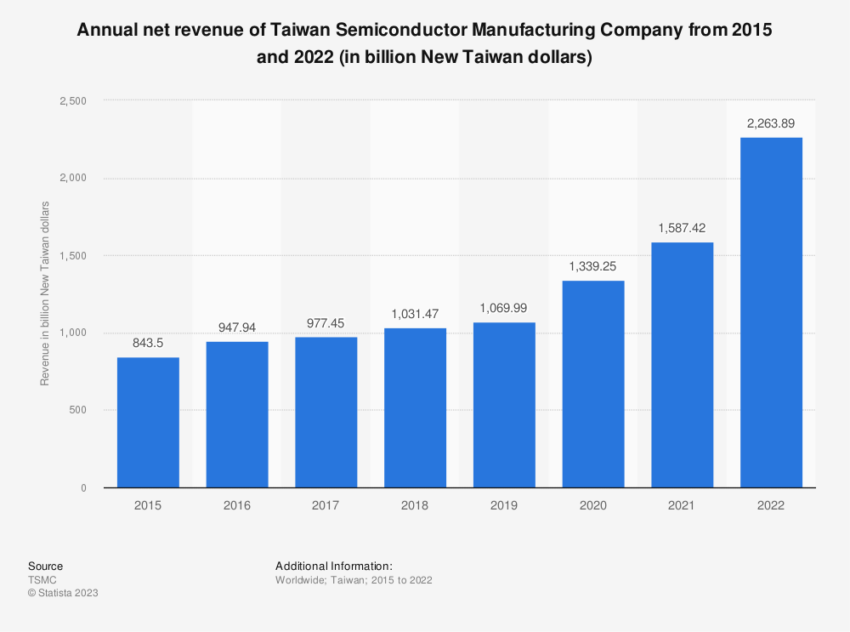Taiwan Semiconductor Manufacturing Company (TSMC) has slashed its 2023 outlook as it battles weak US demand and mediates in the US-China artificial intelligence (AI) chip war.
The company recently cut its revenue forecasts as it tries to straddle a fine line between the semiconductor industry in both the US and China.
US Semiconductor Industry Needs TSMC to Operate at Full Efficiency
Soaring costs and a shortage of skilled workers have hurt the company’s 2023 projections, despite the surge in popularity of artificial intelligence earlier this year. The company could also be witnessing the stabilizing of demand away from hype toward real business cases.
According to TSMC chairman Mark Liu:
“The short-term frenzy about AI demand definitely cannot be extrapolated for the long term.”
The US-China chip wars and geopolitical tensions in the Taiwan Strait have also tested the company.
TSMC is a vital cog in the US semiconductor industry and the country’s bid for dominance in the AI space. According to Amir Anvarzadeh, of Asymmetric Advisers, TSMC is the “only viable” maker of AI chips.
It builds electronics for Nvidia Corporation, whose technology is vital for training large language models on huge datasets. The company also manufactures parts for Apple products at highly-specialized facilities that require millions of dollars to build and run.
Recent internal sources revealed that a small team at Apple is developing a large language model to help the iPhone maker boost efforts in machine learning. The new tool could expand the abilities of Apple’s Siri virtual assistant and image processing and could further boost demand for US-made semiconductors.
New Artificial Intelligence Threats Emerge for TSMC
In addition to trimming forecasts, the company said it would hold off building a new facility in Arizona. The company faces a shortage of skilled US workers and intends to bring workers from Taiwan to compensate.

However, a startup fresh with Abu Dhabi funding may upset those plans. Cerebras Systems announced the construction of a new artificial intelligence supercomputer in Santa Clara, California, on Thursday.
Named Condor Galaxy I, the computer cost $100 million to build. Cerebras hopes it will provide alternatives to AI systems powered by Nvidia chips.
Instead of being made from slices of silicon wafers like Nvidia’s offerings, Condor Galaxy I uses entire silicon wafers. This lets the computer handle large data sets in a single pass rather than processing information in smaller chunks.
Each computer can handle datasets comprising 600 million variables.
Got something to say about the US semiconductor industry or anything else? Write to us or join the discussion on our Telegram channel. You can also catch us on TikTok, Facebook, or Twitter.
Disclaimer
In adherence to the Trust Project guidelines, BeInCrypto is committed to unbiased, transparent reporting. This news article aims to provide accurate, timely information. However, readers are advised to verify facts independently and consult with a professional before making any decisions based on this content. Please note that our Terms and Conditions, Privacy Policy, and Disclaimers have been updated.



